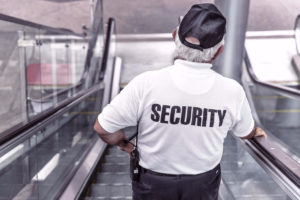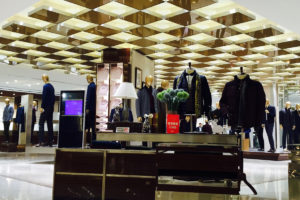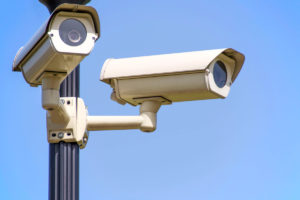 I watched a video shared with me by a former Loss Prevention Manager colleague. The video showed three subjects enter a retail store and all appeared to be wearing masks and at least one looked to be carrying a rifle of some type. There were several employees at the front entrance when the subjects walked in and one of the employees seemed to say something to the one who was carrying what I will refer to as a rifle. The video was not the greatest and the camera is pointing into the store from the exterior door so for the most part, the backs of the perpetrators are seen.
I watched a video shared with me by a former Loss Prevention Manager colleague. The video showed three subjects enter a retail store and all appeared to be wearing masks and at least one looked to be carrying a rifle of some type. There were several employees at the front entrance when the subjects walked in and one of the employees seemed to say something to the one who was carrying what I will refer to as a rifle. The video was not the greatest and the camera is pointing into the store from the exterior door so for the most part, the backs of the perpetrators are seen.
The employee who approached the subject standing at the doorway may have said something and in the video, it appears the employee was hit and knocked to the floor. Two of the bad guys raced into the store and shortly afterward ran out and it seems they were carrying bags. I did not inquire as to what was stolen from the store but one person did inquire why this particular retailer was open after midnight (an unusual time of the evening for this company to have the doors to their stores open). It turns out they were open late for a special sale of “Star Wars” toys being released.
The idea of remaining open late into the night has always disturbed me. In my opinion, it invites all sorts of problems. How do you prevent robberies this late at night? How do you prevent shoplifting? What about the protection you should be offering your customers who come to your store so late? All of these are things that retailers should be considering before they make a decision to try to get one more sale or add one more dollar to the register.
One thing that Loss Prevention departments can do little about is stopping a robbery while it is in the act of occurring. They also cannot control who is coming into a store. This brings me back to the point about store leadership that decides to leave a store open late at night. The idea is that sales are going to surge (for that night or event) and the store has to beat the competition. If a store is going to be open late at night, and the owner/manager believes this is the best business decision my first recommendation is that the store is fully staffed. More employees are a deterrent to thieves and robbers not to mention shoplifters than a skeleton crew.
Customer safety has to be considered and so it is the obligation of management to make sure parking lot lights are all on and working properly. Several weeks prior to the event(s) a thorough inspection of parking lot lighting should be completed and ALL issues fixed by the property owner prior to the event. All exterior building lights must be working to take away areas where criminals may try to lurk. Camera (closed-circuit television systems) installation would be a good idea and today it can be done for relatively little money. Fixed cameras can be installed to monitor front entrances and exits, cash registers, a cash office and even sidewalks and parking lots. Finally, and this can be controversial, hire an armed security officer or off-duty police officer to work the front door of the store.
There are people who have a concern with an armed security officer or off-duty police officer for store protection. This is where the controversy comes in. What if someone(s) enters the store to commit an armed robbery? If that officer draws their weapon to intervene the possibility of innocent customers or employees being injured increases exponentially. On the other hand, an armed officer may be a strong deterrent to would-be robbers and their visibility may prevent shoplifting by being stationed at the front doors. The question remains, what if that one robbery attempt happens and everything goes bad? Store owners and managers MUST take that into consideration before taking that step.
I am not a fan of the late night or overnight store operation. I believe the risks associated with these events along with the possibility of robbery and increased theft, far outweigh the financial gain. Instead, drive profits with great customer service, great values and sales and reduced shortage with the use of retail anti-theft devices. Make safety and security a priority and your employees will appreciate it and customers will reward you by spending money in your store.
 Are you a small business owner dealing with the security of your store? Are you tired of not knowing where the losses are coming from? Employee theft and shoplifting are two of the major losses retail stores across the United States face every day. The millions of dollars the retail industry loses every day are due to employee theft and shoplifting, so how do you prepare yourself from employee theft? Employee background checks can be a first step in dealing with employee theft. Paying for background checks for your employees is investing in the future of your store. Training them and going through the hiring process takes time and money. By hiring the right people the first time, you save time and money that can be spent elsewhere.
Are you a small business owner dealing with the security of your store? Are you tired of not knowing where the losses are coming from? Employee theft and shoplifting are two of the major losses retail stores across the United States face every day. The millions of dollars the retail industry loses every day are due to employee theft and shoplifting, so how do you prepare yourself from employee theft? Employee background checks can be a first step in dealing with employee theft. Paying for background checks for your employees is investing in the future of your store. Training them and going through the hiring process takes time and money. By hiring the right people the first time, you save time and money that can be spent elsewhere.

 Addiction is a big factor is some shoplifters’s lives.
Addiction is a big factor is some shoplifters’s lives. We’ve all been there, we are on our way to work and the next thing you know you come to a standstill. Cars backed up as far as you can see and no one is going anywhere. The clock is ticking away and you begin to worry knowing you are going to be late getting to the office. You look for a side street to try to get out of the mess then, someone with a little bit of guts and a four-wheel drive truck pulls onto the shoulder of the road and speeds by everyone to get to their destination. Everyone gets to where they are going but some people are determined not to let obstacles get in their way and they take the fast track to get there. They went the same route they just overcame the obstacles that would get in their way.
We’ve all been there, we are on our way to work and the next thing you know you come to a standstill. Cars backed up as far as you can see and no one is going anywhere. The clock is ticking away and you begin to worry knowing you are going to be late getting to the office. You look for a side street to try to get out of the mess then, someone with a little bit of guts and a four-wheel drive truck pulls onto the shoulder of the road and speeds by everyone to get to their destination. Everyone gets to where they are going but some people are determined not to let obstacles get in their way and they take the fast track to get there. They went the same route they just overcame the obstacles that would get in their way. Retail shelving along with store design has a huge impact on shoplifting losses. Typically a shoplifter likes and needs privacy even if only for a moment. So why not keep that in mind when designing or remodeling your store. Your shelving and isles can work for you by simply considering several factors.
Retail shelving along with store design has a huge impact on shoplifting losses. Typically a shoplifter likes and needs privacy even if only for a moment. So why not keep that in mind when designing or remodeling your store. Your shelving and isles can work for you by simply considering several factors. Growing up did you ever do something dumb and your mom or your dad would ask you, “What were you thinking?” Having lived in south for the past 32 years I have learned of the local colloquialism when someone does something stupid, “Didn’t your momma teach you better?” Unfortunately, as a young boy I did a lot of dumb things making me wonder if my brain developed a lot later in life than most people. For example, I had a propensity for walking behind batters warming up to go to the plate for my father’s teen baseball teams. I ended up with more than one fat lip from my stupidity…obviously not learning the lesson the first time. I had a fascination with electrical outlets and wires and old rotary dial telephones…I won’t go into details but no they didn’t work when the wires were pushed into the outlet, I was not injured but I had one very busy guardian angel.
Growing up did you ever do something dumb and your mom or your dad would ask you, “What were you thinking?” Having lived in south for the past 32 years I have learned of the local colloquialism when someone does something stupid, “Didn’t your momma teach you better?” Unfortunately, as a young boy I did a lot of dumb things making me wonder if my brain developed a lot later in life than most people. For example, I had a propensity for walking behind batters warming up to go to the plate for my father’s teen baseball teams. I ended up with more than one fat lip from my stupidity…obviously not learning the lesson the first time. I had a fascination with electrical outlets and wires and old rotary dial telephones…I won’t go into details but no they didn’t work when the wires were pushed into the outlet, I was not injured but I had one very busy guardian angel. Loss Prevention Officers and Managers catch shoplifters and dishonest employees. That is a common perception and in some stores it may be a true picture of what Loss Prevention departments do, with the additional caveat that they may have uniformed people who conduct receipt checks. If this is all that the department does it can be hard to sell store managers on the value of having them on staff if the budget for them comes directly from the store. It is even more difficult for small, independent retailers to justify hiring a Loss Prevention Officer although if the store is in a high crime area they may contract a security guard. There was a time when there was an “us versus them” mindset between store managers and Loss Prevention teams. Over time some larger companies have focused their Loss Prevention teams more on operational issues. For example, I worked for a company that had Loss Prevention conduct food product out of date audits. Their position was that this was a safety issue so it fell to the Loss Prevention team. I had no problem doing the audits, but as I looked at the amount of out of date items I was finding I had to question what the freight team was doing when they were stocking. Who was auditing their work because there were a lot of FIFO (First In First Out) issues I was identifying that were causing out of date problems.
Loss Prevention Officers and Managers catch shoplifters and dishonest employees. That is a common perception and in some stores it may be a true picture of what Loss Prevention departments do, with the additional caveat that they may have uniformed people who conduct receipt checks. If this is all that the department does it can be hard to sell store managers on the value of having them on staff if the budget for them comes directly from the store. It is even more difficult for small, independent retailers to justify hiring a Loss Prevention Officer although if the store is in a high crime area they may contract a security guard. There was a time when there was an “us versus them” mindset between store managers and Loss Prevention teams. Over time some larger companies have focused their Loss Prevention teams more on operational issues. For example, I worked for a company that had Loss Prevention conduct food product out of date audits. Their position was that this was a safety issue so it fell to the Loss Prevention team. I had no problem doing the audits, but as I looked at the amount of out of date items I was finding I had to question what the freight team was doing when they were stocking. Who was auditing their work because there were a lot of FIFO (First In First Out) issues I was identifying that were causing out of date problems.